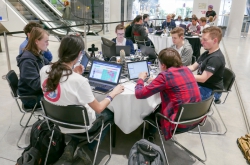How to find a suitable job
Define your field. Cybersecurity encompasses a range of fields, from identifying and preventing vulnerabilities to setting up network equipment and securing web systems. Before you make and start to send out your CV, it’s best if you know which field of cybersecurity you would like to pursue. When answering this question, you should consider your experience and knowledge, as well as thoroughly study which tasks you will perform and, above all, understand whether you enjoy doing it or not.
For this, you can attempt solving varied lab tasks from open databases, tackling challenges as part of the Bug Bounty program, participating in CTF (Capture the Flag) competitions, and even playing online games based on cybersecurity problems.
How to choose. Say, you like coding and looking for unconventional solutions. Then, Anastasiia Krasnova recommends looking into product security, or ProdSec for short. As a ProdSec specialist, you will ensure and improve the security of web applications, as well as analyze code for flaws and bugs.
Pentesters are constantly seeking new ways to hack a system. If a pentester manages to bypass the protection, access your data, and control your computer or system, they record the vulnerability and add it to the test findings. If you want to become an ethical hacker, this one's for you. Future DevSecOps, in their turn, should be lazy – not literally, though. This field requires you to optimize everything so much that you won’t need to fix your code every time.
Weed out the unnecessary. When you settle on your desires, it’ll be easier to weed out what doesn’t suit you. Once you do that, you will need to look through the rest of the offers and identify what experience, knowledge, and skills you have for each of the vacancies.
What to do if you have no experience
It’s best not to apply for every job that you see on corporate websites. This will not improve your chance of getting in.
What you can do instead:
-
Start with internships. You can find them on your own on companies’ websites, just as job offerings;
-
Consider internship options offered by universities. This is an excellent chance to demonstrate your skills and stay at the company of your choice;
-
Grow your network. You should start growing your professional network while you’re still a student by attending conferences, hackathons, and case championships. It’s easier to find a job through acquaintances.

Positive Hack Days Fest 2. Photo by ITMO’s Faculty of Secure Information Technologies
How to write a CV to improve your chances
Some believe that experienced specialists can land a job without a CV. However, that’s not true. Your CV will help you pass the initial selection and receive an invitation for an interview with a technician or an executive.
On average, recruiters look at CVs for 7-10 seconds. They look for clear, well-structured, concise resumes highlighting relevant information.
What to do:
-
Divide your text into four main blocks: contacts, education, relevant experience, and skills;
-
List your work experiences in a chronological order and briefly describe what exactly you did within each job. If you have no experience, include in your CV the information about internships, case competitions, and study projects you took part in;
-
Add your achievements, completed courses, and language proficiency in the skills block;
-
Separate blocks from one another visually (e.g., headings);
-
Keep your CV on one page;
-
Check your CV for spelling, punctuation, and factual errors.

Positive Hack Days Fest 2. Photo by ITMO’s Faculty of Secure Information Technologies
What not to do:
Include irrelevant experience and skills. If you do this, recruiters may miss important details. However, you shouldn’t keep quiet about your honors diploma. There’s a common misconception that honors graduates don’t get employed because they can only study. As a rule, though, an honors degree is seen as a sign of dedication and concentration skills, as well as an ability to reach goals.
Copy and paste your former responsibilities. This will make your CV overloaded and artificially expand it. No recruiter is able to read a three-page-long CV in 10 seconds, meaning that they may overlook crucial information.
Hide contact information. It’s rather likely that no one will look for other ways to get in touch with you and simply put your CV aside. Undisclosed place of former employment will arouse suspicions, too.
Lie on your CV. Recruiters always check resume information at interviews; they may also contact your former employer.
The talk was delivered by Anastasiia Krasnova at Positive Hack Days Fest 2, which brought together experts from T-Bank (formerly Tinkoff), MTS, and other companies to speak about how to get into infosec, what field to choose, and where to look for internships and jobs. The event was co-organized by ITMO’s Faculty of Secure Information Technologies.





